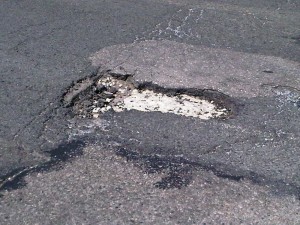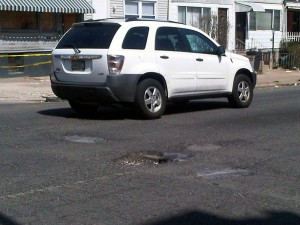
https://vimeo.com/18395093]
[soundslide url=”https://smcsites.com/soundslides/uploads/sp1038market/” height=550 width=600]
The next and newest battle drivers face after the long winter of severe weather conditions are the potholes plaguing the city streets as the rainy months of spring have begun.
In West Philadelphia, drivers complain that Market, Walnut and Chestnut streets are both the busiest roads in the area and the most problematic where potholes are concerned.
“People are angry because there are so many that it is hard to avoid from street to street,” said Cindy Hill, 23, and a secretary at Cee Johnson’s Auto Services on 55th and Chestnut atreets.

After a severe winter, heavy volumes of traffic and snowplows, small cracks begin to form in the streets. Moisture gets into these cracks as ice and snow melt and rain takes place, and these cracks turn into potholes.
“They really have to do something about these potholes,” said Lou Fiorelli, 31, and a truck driver for a moving company. “You hit some of these potholes with these trucks and you are flying.”
The Philadelphia Streets Department launched “Operation Smooth Streets,” a program to improve the roadways in Philadelphia.
With this program, citizens’ pothole requests received by 2 p.m. Monday through Friday and found on city and state streets will be repaired within the next business day.
When reporting a pothole, citizens are asked to provide as much information as possible about the exact location, size, shape, traffic obstruction and the presence of running water.
The problem in quickly and efficiently fixing potholes, citizens would argue, is that the entities that deal with potholes are different depending on the street locations.
If a pothole is located on a city street, the Philadelphia Streets Department will service it. If a pothole is located on a state-maintained street, the Streets Department will inspect the location and forward the request to the Pennsylvania Department of Transportation (PennDot). If a pothole is located near or 18 inches on either side of a SEPTA trolley track, then it is the responsibility of SEPTA to service it.
“The roads in Philadelphia are a disgrace in many places,” said Virginia Santangelio, 65. “I have spent over $100 getting new front-end alignment due to one of the beautiful ‘basements’ they’re building in the middle of the road, as I refer to them.”

Santangelio suggested as one idea that the city use people who have outstanding tickets or other traffic violations go out with crews and help fix the streets. She thinks this process would fix the problem with potholes faster and make the streets safer.
The Streets Department asks that citizens specify whether the defect is a pothole, a ditch or a cave-in. A pothole is defined as a bowl-shaped opening that usually has raveled edges and can be up to 10 inches deep. Ditches are rectangular excavations in the roadway that are made by utilities and plumbers to reach underground lines. Cave-ins are holes that reach past the concrete base of the roadway.
A press release was issued by the Streets Department addressing the issue of potholes in early March. The department recognized that this winter’s excessive snow and varying temperatures have taken a toll on the city’s roads.
Commissioner Clarena I.W. Tolson said in the release: “Citizens can be our best inspectors. Whether you see a pothole, or a ditch unraveling, or the presence of water at the location, citizens should contact the Streets Department Customer Affairs Unit…”
“Each defect is repaired differently,” said Steve Buckley, deputy commissioner for transportation in the press release. “You can help us better serve you by properly identifying the issue.”
Pothole season in Philadelphia is typically considered to run from mid-March to the end of April.
David Harrison, 23, is a mechanic at Cee Johnson’s Auto Services. He said he services about five or six cars per week due to pothole-related damages. Typical damages are to tire rods, ball joints, suspension, alignment, struts, axles, fenders, tires and rims.
Hill said prices range anywhere from $150 to $2,000. “It’s not like the government is going to fix it, and it puts wear and tear on your car faster then it has to.”
The mechanics at Larry’s Auto Repair on 55th and Walnut streets agreed that a number of customers who come in for car repairs have the same damages from potholes as those at Cee Johnson’s. Larry’s fixes four to five cars per week that have pothole-related damages
“I just hit one coming from the Cherry Hill Mall,” said Kathy Gibson, 34, and a crossing guard in West Philadelphia. “Now my alignment is off and it’s going to cost me hundreds of dollars to get my car fixed.”

At the crossing corner Gibson works at, she said there are several potholes that people always run over and it sounds as if the tires are going to blow out. Gibson is angry because she feels it would be cheaper for the government to fix the potholes than for citizens to have to pay for the safety risks and damages to their cars due to potholes.
“If they are going to repave it, they need to use better materials or something,” said Harrison.
“They somewhat take care of it,” said Hill. “Because they’re just filling them in and we’re constantly riding over them, the potholes just open back up again.”
Fiorelli agreed. “I get ticked off because I don’t get my morning cup of coffee because half the time it’s all over the cabin.” For Fiorelli, he hopes that the city will fix the potholes on the major highways like I-95 and I-76 for a safer morning commute to work.
To report a pothole, call the City Services Unit at 215-686-5560.


Be the first to comment